News
Apathetic Colombo contrasts with more enthusiastic Gampaha, Kalutara
As far as prizes in national elections go, the Western province is the biggest there is. The beating heart of the country’s economy, over 4.4 million registered voters in the three districts here will go to the polls on August 5 to elect representatives to the new parliament.
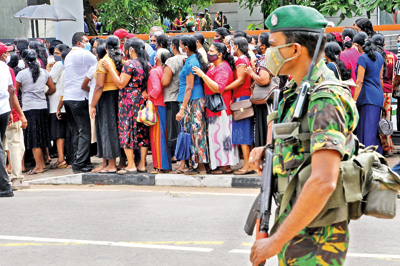
Social distancing thrown to the wind: SLPP supporters queueing to enter the Udugampola ‘Sathi Pola’ premises in Gampaha on Thursday where President Gotabaya Rajapaksa attended an SLPP meeting. Pix by Amila Gamage and Priyantha Wickramaarachchi
The prevailing COVID-19 pandemic, coupled with the strict enforcement of election regulations, have made it more difficult for first-time candidates to conduct their campaigns compared to more established ones. Most of the leading candidates from established political parties contesting from the province have been in Parliament before and have a good chance of being re-elected.
While political parties have stepped up meetings in the province as the campaign enters the home stretch, the posters, cutouts and banners that have been such eyesores in previous elections are hardly visible on the main roads, though some can be seen as you move into the interior of the province.
Coming just eight months after the presidential election, the ‘Gotabaya factor’ may well be a decisive one at the 2020 Parliamentary elections. During our visit across the province, we witnessed that President Gotabaya Rajapaksa enjoys wide popularity, especially in the Gampaha and Kalutara districts.
The Sri Lanka Podujana Peramuna (SLPP) is acutely aware that its fortunes at this election are tied to the president’s popularity. President Rajapaksa therefore, is making appearances at numerous campaign meetings organised in support of SLPP candidates.
The Samagi Jana Balawegaya (SJB) and the United National Party (UNP) meanwhile, are also campaigning hard within the province. Both SJB Leader Sajith Premadasa and UNP Leader Ranil Wickremesinghe are contesting the election from the Colombo district, as is Janatha Vimukthi Peramuna (JVP) Leader Anura Kumara Dissanayake, who is contesting under the National People’s Power (NPP).
The NPP believes that the split within the UNP will bring more votes to them. The SJB is insistent that the bulk of the UNP voter base has flocked to their camp since most of the former MPs who represented the UNP at the last Parliament are with them. In the wake of the defection of many former MPs to the SJB, the UNP is fielding a largely new crop of candidates.
Colombo District
Colombo- the home for those who moved into the city for various purposes in their lives saw little interest in Parliamentary polls as the city is struggling to come back to normalcy following a three month long lockdown due to the COVID-19 global pandemic.
By 6.30-7 p.m. there’s less traffic and little night life unlike before the pandemic hit the country.
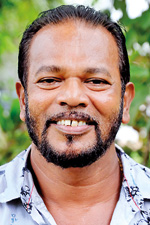
Palitha Thewaraperuma: Well-known figure among the locals
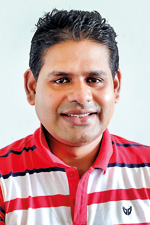
Kalutara: Sanjeeva Edirimanna: New candidate from the SLPP
Increasing cost of living and unemployment crisis have become more pressing issues in the district which has 1.7 million registered voters.
Arumugam Suresh, who is running a mini tailor shop in Rajagiriya market says none of the candidates contesting in Kotte electorate has any plans on improving the economic condition of the people who are badly by the pandemic.
“Three month rent for my shop is still pending during which the city was under total lockdown. We are under huge economic difficulties as we did not have proper income for over two months,” Suresh said, alleging that two of the candidates were on the local Municipal council for three to five years but failed to do anything good for the people.
Nimal Bandara, 54, an electrical repair shop owner from Rajagiriya, is not sure whether he would vote this time since he is worried about the pandemic situation in the country.
“I’m concerned about voting this time even though politicians are focused on getting our votes. What would happen if we get sick? We would be in trouble, I’m really thinking about this,” Mr Bandara said. Most of the customers at his shop also expressed the same view while stressing financial difficulty due to the pandemic was a vital factor deciding to vote or not to.
For a lottery ticket seller like W. Ramya Priyanthi, 54, in Rajagiriya town, his daily income depends on how many lottery tickets are sold but after the pandemic , it has dropped drastically.
“We experienced many difficulties over the last two and half months due to the lockdown, we expect things would be better in the future. No one has done anything good for us even though we vote every time. If the next elected candidates can do any good for us, it would be good,”she said, while noting that the main expectation from the people from the new Parliament is that the cost of living be brought down.
Former Parliamentarian Dr Harsha de Silva contesting under the Samagi Jana Balawegaya (SJB) ticket said like former President J.R. Jayewardene had a team that was vital for implementing his economic policies, Sajith Premadasa too is armed with an economic team to lead the country in the post- pandemic period.
“We are stuck in producing simple products at low wages,we cannot develop as a nation if we continue down that road. We need to start making complex products that would pay high wages for our workers,” Dr Silva said while noting that he was proud of what he had achieved during the previous government where he oversaw the implementation of the 1990 Suwasariya free health service.
Former Mayor of the Sri Jayewardenepura, Madura Vithanage who is contesting for the first time in a Parliamentary elections under the Sri Lanka Podujana Peramuna (SLPP) said that he is coming forward because he wants to join hands with President Rajapaksa in his initiative of form a new political culture in the country.
Attorney at Law by profession, Mr Vithange acknowledged that people, particularly young voters are fed up with the current political system where there is little space for young bloodand he is determined to make a change in his electorate of Kotte.
A mother and daughter duo running a mini tea stall on the Rajagiriya flyover said they are not planning to go to their village in Badulla this time to vote considering theie financial difficulties. During the previous Presidential election, the family of six voters hired a van to go to their village to vote.
Gampaha District
The Gampaha district has the largest number of registered voters in the country, with 1,785, 964 eligible to cast their ballots at this year’s election. All but one of the 13 electorates in the district have more than 100, 000 registered voters. The UNP won a narrow victory here at the 2015 Parliamentary Election, polling 47.13% of the overall valid votes as opposed to the UPFA’s 44.92%. The UNP obtained nine seats while the UPFA got eight seats. The JVP secured one seat.
The district however, voted overwhelmingly for President Gotabaya Rajapaksa at November’s presidential election, where he polled 59.28% of the total valid vote.
When we visited the Gampaha district on Thursday, President Rajapaksa was also there, attending a host of rallies organized by SLPP candidates. We saw him attend a campaign meeting organised by former Minister Prasanna Ranatunga at the Udugampola ‘Sathi Pola’ premises on Thursday afternoon.
We saw SLPP flags at the roundabout at the entrance to Udugampola town when we passed by in the morning. The meeting venue was some distance away. By the time we returned in the afternoon however, the flags at the roundabout had been removed, evidently because they violated election laws.
A large number of party supporters, both young and old, were being subjected to security checks and health checks when we arrived. Many female supporters who came brought their young children with them. Hand-washing areas had been set up at the entrance to the meeting venue, but the large number of people jostling to get in before the President arrived meant that many did not make use of them. Most attendees, though not all, wore face masks. The lone member of the Presidential Security Division tasked with checking the temperatures of those going in was overwhelmed, with some people simply walking past him even as he tried to aim a hand-held electronic thermometer at their heads.
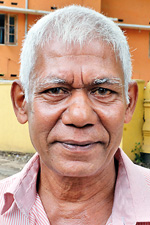
Nandana Silva: Bus driver
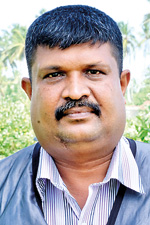
Lalith Manjula Silva, an election monitor attached to CMEV
Eight months after the presidential election, President Rajapaksa remains extremely popular here, judging by the sentiments expressed by those we spoke to, though they were less enthusiastic about the SLPP he represents.
“President Gotabaya Rajapaksa is the only leader who can develop this country, but those around him aren’t letting him do that,” said Kaushalya Wijewardena (45), who runs a grocery shop in Yakkala. Ms Wijewardena said she often listens to the President’s speeches and is impressed by his vision for the country. “Look how well he handled this COVID-19 crisis. He should be given a chance to build the country for the next five years. We can judge him by the end of that period.”
Though she will vote for the SLPP at the upcoming election, Ms Wijewardena is not impressed by the candidates the party is fielding from the district. Nevertheless, she hopes voters will give a majority to the SLPP as President Rajapaksa has said that he would need such a majority to implement his vision in full.
A short distance away, Titus Pathiraja (61), who runs a tea shop, has resolved to vote for the SJB. A strong UNP supporter for decades, Mr Pathiraja said it was a difficult choice for him to leave his party behind and support the SJB. “It will be a hard day for me when I have to go to the polling booth and mark my vote for another symbol when the elephant is also on the ballot,” Mr Pathiraja said, though he added that he has made peace with his decision as he believes Sajith Premadasa is a leader who can do a lot of good for the country.
In Kimbulapitiya, we met Sepala Fernando (61), who owns a fireworks business. The area is famous for its fireworks and there are many factories producing fireworks and outlets that sell them. Those in the business suffered heavily due to the pandemic, Mr Fernando said. “We had our stocks ready for the Avrudu season when the lockdown occured in March. We still haven’t recovered from that.” Mr Fernando employs over 100 people in his fireworks business but said he managed to keep everyone on the payroll on reduced wages.
He added that things were even worse under the previous government. “Various officials imposed different rules on us. We would have gone out of business if that continued. Things were much better for us under former President Mahinda Rajapaksa and we hope he can help our industry again after the election.”
For fishermen in Negombo, the high prices of fuel is a major concern. “World oil prices have fallen, yet the government continues to keep fuel prices as they are,” complained Srimal Silva (49). Given the amount of fuel that fishing boats consume on a daily basis, he said the cost was far too much. “We heard Sajith Premadasa promise to reduce the cost of fuel within 20 days if the SJB comes to power. Let’s see if that’ll happen,” he added.
Fishermen W.S.D. Croos (32) and Romesh Nirodha (24) were also of the view that fuel prices could be reduced. “Things are much better now than they were under the previous government. We do see President Gotabaya Rajapaksa doing some good work, but we’ll have to see if it’ll continue after the election,” Mr Croos quipped.
Political parties, meanwhile, are campaigning hard for every vote in this most vital district. While the JVP obtained one Parliamentary seat from the district at the 2015 Parliamentary Election, the NPP alliance it now leads is targeting at least two seats this time from the district, confident that UNP supporters disillusioned by the party’s split and those disappointed with the new government will turn up in sizeable numbers to vote for them.
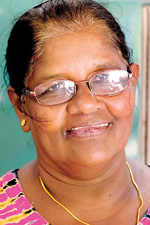
U.K.D. Mallika: Runs a grocery store
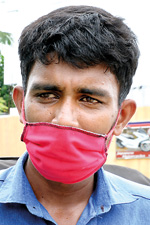
Ranga Sampath a roadside fruit seller
“We have already seen former supporters of both the SLPP and the two UNP factions at our meetings,” said former Western Provincial Councilor and trade unionist Mahinda Jayasinghe, who is contesting from the NPP. Mr Jayasinghe, the General Secretary of the Ceylon Teachers’ Service Union, said he aims to work on resolving issues in the education sector if he becomes an MP.
What is more difficult than campaigning in the midst of COVID-19 is campaigning in an environment where the number of votes you get is heavily influenced by how much money you have and are willing to spend, said SJB Gampaha district leader and former State Minister Edward Gunasekara. “Every evening during this campaign season, we have politicians of all parties conducting informal meetings at hotels and reception halls, where they give free food and drinks in attempts to buy votes. They even send gifts to households.”
Mr Gunasekara has been in active politics since 1993. This is his 11th election. “If we had remained with Ranil Wickremesinghe, we would have lost heavily,” he remarked, adding that whatever the SLPP claimed, the SJB was a force to be reckoned with and was attracting new supporters every day. “All that the government did during the past eight months was to do the easy thing and cut whatever benefits people were getting. You don’t need a government to do the easy thing,” he stressed.
One thing the veteran politician is grateful for, is that campaigning has occurred in a largely peaceful atmosphere. He recalled the 2001 Parliamentary Election, when 15 vehicles belonging to him and his supporters were attacked in a single day. “Those days are now gone, and that is good.”
Many young, first-time candidates are also contesting this parliamentary election. We met Waruna Rajapaksa while he was busy organising a campaign meeting at a reception hall in Yakkala that was due to be attended by UNP leader Ranil Wickremesinghe and former State Minister Ruwan Wijewardene. Mr Rajapaksa, a businessman who is contesting on the UNP ticket from Gampaha, said he believes it is the UNP that’s best suited to resolve the current economic problems plaguing the country.
“Not too long ago, there were many voters who claimed they didn’t want any of the same 225 individuals who represented the last Parliament. The UNP has now created space for an entirely new generation of young candidates with unblemished records to contest and be elected to Parliament,” he noted.
Kalutara District
In Kalutara, where President Gotabaya Rajapaksa is exceptionally popular among rural masses, voters said they hope for a parliament with ‘decent’ Parliamentarians as the country is struggling with economic difficulties due to the global pandemic.
On Wednesday, President Rajapaksa visited Bulathsinhala where he spoke to supporters while endorsing candidates contesting under SLPP ticket.
U.K.D. Mallika, who runs a grocery store in Dodangoda said that even though the election mood is relatively muted compared to previous elections, local candidates from SLPP are quite popular because of President Rajapaksa’s backing to that party.
“We hope whoever is elected to Parliament would do a fair job for the sake of the country. We cannot say the previous government didn’t do anything. Our local road repairs were carried out during their term,” she said while lamenting that her daily income from the shop went significantly down after the pandemic.
Ranga Sampath (33), a roadside fruit seller from Kalutara is of the view that they have to elect the right persons who have the potential to serve the people to Parliament considering the future generations of this country.
Mr Sampath, who used to work as a mason but lost his job after the pandemic charged that the previous government did nothing significant for the people but only cared about themselves. “When we look at those who were in the last government, many were merely greedy for power and worked for money. After the pandemic hit the country, it was the President who ensured that the country is safe and took steps to bring the country back to normalcy. I’m doing this business on the road today because of his leadership,” Sampath said.
Sanjeeva Edirimanna, a new candidate from the SLPP said he decided to contest the polls after witnessing the regime change in 2015 as a journalist, which he considered as a ‘forced change’ where people were manipulated to vote out the then government.
As a one time journalist in a state broadcasting corporation, he says now as a candidate, he finds it extremely difficult to carry out a good campaign in the district because of inter-party conflicts in addition to shortage of finances.
“The country seems to be developing over time but the situation in the grassroot level is totally different where people’s feelings are not understood by politicians properly. People are going through enormous economic difficulties following the pandemic,” Mr Edirmannge said, stressing that since he believes he understands the pulse of the people, he would be a better representative for the people in Kalutara, if elected.
Palitha Thewaraperuma, contesting on the UNP ticket is a well-known figure among the locals for being the first to take up local issues and disputes. He has a significant vote bank among the rubber plantation and tea estate workers who say he is always available when needed.
When asked whether he considers himself as a modern Robin Hood for his involvement in local issues including the recent dispute over laying water pipes along the Kalutara Main Street where he was attacked by a group, he said if the law isn’t implemented properly, one has to act like Robin Hood and Sura Saradiel.
“I would work against those who commit injustice against people and take the country towards development.”
Regretting his involvement during a clash inside the chambers during the previous Parliament with Opposition Parliamentarians which was live telecasted, Mr Thewaraperuma is hopeful that he has much to offer to his electorate.
Dr. Nalinda Jayatissa, a former parliamentarian said unlike any other political party contesting in the district, the JVP-led NPP alliance is fielding young professionals as candidates.
“The division in the UNP in the Kalutara district is advantageous to us since many of them started to align themselves with us,” Dr Jayatissa said while referring to a recent incident where an ardent UNP supporter extended support to the NPP. Nandana Silva, 65, a bus driver from Kalutara said that the top priority of the new Parliament should be easing the economic burden of the masses as many are struggling without proper income. He said, he used to make Rs 2500 a day but now it is around Rs 1200.
Pensioneer Leelawathi Salgadu, 71 says nothing significant has improved for the masses over the years. “I have been voting for years but nothing good has happened to us even though we kept voting. I hope this will change in near future.”
Lalith Manjula Silva, an election monitor attached to the Centre for Monitoring Election Violence (CMEV) stationed in Kalutara said the election mood on the ground level was relatively peaceful with minor incidents being reported.
However, Mr Silva noted that safety guidelines issued by authorities for election campaigns in the face of COVID were being completely disregarded by political parties as many campaign activities saw attendees not wearing masks or following social distancing.
In contrary to the maximum number of three persons allowed to carry out house to house campaign, 10-15 people from political parties were seen engaging in canvassing, Mr Silva added.

